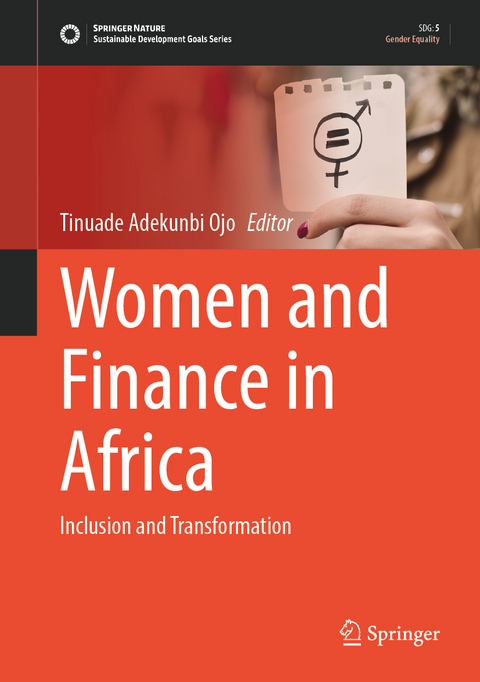
Women and Finance in Africa
Springer International Publishing (Verlag)
978-3-031-53336-5 (ISBN)
This volume presents a collection of cases that examine the status of financial inclusion for women across a variety of states in the African continent. The book uses a qualitative research method and presents both primary to secondary data to narrate the impact of gender-responsive budgeting on women's empowerment and gender equality in these communities. The chapters present the analysis of the effectiveness of African state' approaches and share lessons that different African economies, whether currently booming or struggling, can enhance or implement toward the financial inclusion and gender budgeting response at all structural levels. The main objectives of this volume are to understand different processes for financial inclusion to gender issues at a national level and to help encourage reflection on what lessons could be learned between states and what factors cause divergence in multilateral settings so that they can be understood and addressed.
Dr Tinuade Adekunbi Ojo is the unit head for Pan African Women Studies at the Institute of Pan African Thought and Conversation. She is very passionate, energetic, and authentic with her approaches. She is a GLOBAL TRANSFORMATIONAL KEYNOTE SPEAKER, EDUCATIONAL CONSULTANT, and MENTORING COACH who impact others for PURPOSE!. She also serves as an academic and researcher at the Department of Politics and International Relations and the 4IR and Digital Policy Research Unit at the University of Johannesburg. She holds a PhD in political science from the University of Pretoria. Her master's and honours were in Development Studies from UNISA. As a feminist political economist, her work explores the gendered dimension of trade, financial inclusion, sustainable development goals, digital transformation in policy, politics and digitalization, international political economy, gender inequality and poverty reduction strategies. Tinuade has published a wide range of works on gender and development policy, the IMF's external relations with Africa, BRICS, Southern Africa, and West Africa, focusing on the political economy of trade and aid. In addition, she has acted as a peer reviewer for renowned scientific journals.
Additionally, Tinuade is a senior research fellow for the African School of Governance and Policy Studies and a research associate at the African Centre for the Study of the United States (ACSUS-UP). She has held and still holds various administrative portfolios, including tutor, supervisor, usher, mentor, and administrator for postgraduate students. She is an Associate Editor for African Journal for Political Science (AJPS), and BRICS Journal and Managing Editor and Researcher for the Digital Policy Studies Unit (4DPRU) at Johannesburg. Tinuade is a member of international and local associates, CAAS, IPSA, AAPS, ASA, DSA, UNASA UP, SACE, SAAPS, and others. Tinuade is the African Association of Political Science (AAPS) program officer. She is responsible for Partnership and Resource Mobilization for CBWN-Africa. Additionally, she receives many awards, scholarships and grants, presented at local and international conferences.
Tinuade has also worked with several civil societies and international institutions to advance the course on women's economic empowerment and sustainability.Chapter 1: Gendered Finance: Inclusion and Transformation.- Chapter 2: Informal financial services in the financial inclusion matrix: gendered perspectives from Kenya and Zimbabwe.- Chapter 3: Understanding financial inclusion in Africa from the perspective of saving and borrowing patterns.- Chpater 4: The Political Socioeconomic Fallout of the Mismanagement of COVID-19 Public Funds in South Africa.- Chapter 5: Re-imagining informal settlements as spaces for enhancing women informal entrepreneurship in South Africa: a financial inclusion perspective.- Chapter 6: The Role of Institutions in Promoting Financial Inclusion of MSMEs in Zimbabwe.- Chapter 7: Fintech and Financial inclusion: Closing the gender gap.- Chapter 8: Financing Women and Gender Inclusion in Cote d'Ivoire's Peacebuilding Process.- Chapter 9: Digital Financial Inclusion for Women in Africa: Prospects and Challenges.- Chapter 10: Gender and Digital Financial Inclusion: Assessment of Rural/Urban Dichotomy in Microfinance and Table Banking Operations in ECOWAS.- Chapter 11: Gendered Dimension for Digital Financial Inclusion in Nigeria.
| Erscheinungsdatum | 11.05.2024 |
|---|---|
| Reihe/Serie | Sustainable Development Goals Series |
| Zusatzinfo | XXVI, 148 p. 15 illus., 13 illus. in color. |
| Verlagsort | Cham |
| Sprache | englisch |
| Maße | 178 x 254 mm |
| Themenwelt | Naturwissenschaften ► Biologie ► Ökologie / Naturschutz |
| Naturwissenschaften ► Geowissenschaften | |
| Sozialwissenschaften ► Politik / Verwaltung | |
| Wirtschaft ► Betriebswirtschaft / Management ► Unternehmensführung / Management | |
| Wirtschaft ► Volkswirtschaftslehre | |
| Schlagworte | Digital financial inclusion • Female Entrepreneurship • finance in africa • Gender Budgeting • Microfinance • Rural/urban dichotomy |
| ISBN-10 | 3-031-53336-4 / 3031533364 |
| ISBN-13 | 978-3-031-53336-5 / 9783031533365 |
| Zustand | Neuware |
| Haben Sie eine Frage zum Produkt? |
aus dem Bereich


